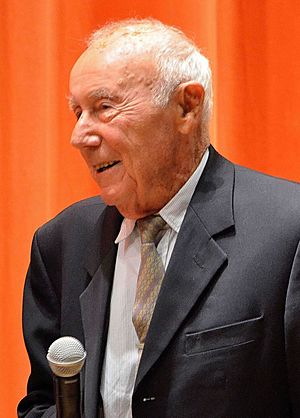Simcha Rotem facts for kids
Quick facts for kids
Simcha Rotem
|
|
|---|---|

Rotem in 2013
|
|
| Born |
Simcha (Szymon) Rathajzer
24 February 1924 Warsaw, Poland
|
| Died | 22 December 2018 (aged 94) Jerusalem, Israel
|
| Nationality | Polish, Israeli |
| Known for | Member of the Żydowska Organizacja Bojowa (Jewish Combat Organization), participant in the Warsaw Ghetto Uprising and the Warsaw Uprising |
Simcha Rotem (born Simcha (Szymon) Rathajzer, also known by his special code name Kazik; 24 February 1924 – 22 December 2018) was a brave Polish-Israeli hero. He was part of the Jewish underground group in Warsaw during World War II. Simcha was the main messenger for the Jewish Fighting Organization (ŻOB). This group planned and fought back against the Nazis during the Warsaw Ghetto Uprising.
Simcha Rotem was one of the very last Jewish fighters who survived the Warsaw Uprising. He was also the last fighter from the 1943 Warsaw Ghetto Uprising to pass away. His story shows great courage and strength during a very difficult time.
Contents
Early Life
Simcha Rotem was born in 1924 in Warsaw, Poland. From a young age, he saw how some people were treated unfairly because they were Jewish. He joined a youth group called Akiva, which was about Jewish pride and building a new home.
World War II
When World War II began, Simcha's family home was hit by a German bomb. He was hurt, and sadly, his brother and other family members died. This was a very tough start to the war for him.
Life in the Warsaw Ghetto
In 1942, Simcha joined the Jewish Fighting Organization (ŻOB). This group was formed to resist the Nazis. Simcha became very important as a messenger for the fighters in the Warsaw Ghetto. He had a secret nickname, "Kazik." This name came from a Polish name meaning "someone who defeats an enemy's power in battle."
The Warsaw Ghetto Uprising
As a member of ŻOB, Kazik fought in the Warsaw Ghetto Uprising. He was the main messenger, reporting directly to the ŻOB leader outside the ghetto, Yitzhak Zuckerman. The main commander of the ŻOB was Mordechai Anielewicz.
When it became clear that the Germans were winning, Kazik was sent to the non-Jewish side of Warsaw. He was supposed to help plan an escape for the fighters. But the secret path he used was found by the Nazis. This meant he and Zuckerman were stuck outside while the ghetto burned.
Kazik was desperate to get back to his friends. He tried many times to enter the ghetto through the sewers. Finally, he succeeded. Inside, he found Zivia Lubetkin, one of the last leaders of the uprising. Kazik led her and about 80 other fighters through the sewers to safety. They then went to the forests outside the city.
For the rest of the war, Simcha continued to work with the resistance. He helped thousands of Jewish people who were still hiding in Warsaw. In August 1944, he also took part in the Polish Warsaw Uprising. In July 1945, after the war ended, Simcha Rotem visited the ruins of the Warsaw Ghetto. He went to the place where the ŻOB command bunker, Miła 18, used to be, with other survivors.
After the War
After World War II, Simcha Rotem joined a group called Beriha. This group helped Jewish people in Europe move to Mandate Palestine (which is now Israel). This was difficult because the British had rules that limited how many people could enter.
Even though his twelve-year-old sister was killed in the ghetto uprising, his parents and another sister survived by hiding. In 1947, Simcha and his surviving family moved to Mandate Palestine. He lived in Jerusalem for the rest of his life.
Simcha Rotem was a very important person. At the time of his death in 2018, he was the last surviving fighter from the 1943 Warsaw Ghetto Uprising.
In the 2001 TV mini-series Uprising, an actor named Stephen Moyer played Simcha Rotem.
In 2018, Simcha Rotem spoke out about history. He wrote a letter to the Polish president, Andrzej Duda. Rotem said it was important to remember the big difference between the suffering of the Polish people and the planned killing of Jewish people by the Nazis. He also said that some Poles helped the Nazis. He believed that for history to be truly understood, society must face the full truth. He was against a new law in Poland that he felt tried to hide some of the difficult parts of history.
Awards and Recognition
Simcha Rotem received several important awards for his bravery and service:
- Grand Cross of the Order of Polonia Restituta (2013)
- Officer's Cross of the Order of Merit of the Republic of Poland (2003)
- Gold Polish Army Medal (2013)
 | Georgia Louise Harris Brown |
 | Julian Abele |
 | Norma Merrick Sklarek |
 | William Sidney Pittman |


